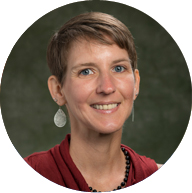 When a high school math teacher saw a need for education reform, she ended up in the perfect position to make a difference.
When a high school math teacher saw a need for education reform, she ended up in the perfect position to make a difference.
Amber Simpson went back to school for her doctoral degree in curriculum and instruction in mathematics education at Clemson University. Now she’s an assistant professor of math education at Binghamton University.
“I had no idea what a PhD actually meant or required,” Simpson says. “But I started taking research classes and my world just flipped. I loved how you can contribute to the education field through research, and so that was a huge eye-opening experience for me, almost by happenstance.”
At Binghamton, Simpson says she has focused her research and coursework on changing the stigma associated with math education.
“Most students think of learning mathematics as, ‘Let me sit at my desk, listen to the teacher present procedures and do my homework,’” Simpson says. “But there’s a lot of research that supports the idea of inquiry, allowing kids to brainstorm ways to solve the problem through various approaches and having classroom discussions about their strategies.”
In spring 2019, Simpson designed and taught a service-learning course called Making and Tinkering — an education class focused on design, physical creation and problem-solving. Students worked in groups to develop youth making programs. They implemented them in the community through a partnership with the Windsor Central School District and Your Home Public Library in Johnson City, Simpson says.
“Makerspaces provide a place for anyone to just go and make things, and tinker with things,” Simpson says. “Making can including high-tech tools such as 3D printers and laser cutters, low-tech tools such as makey-makeys and arduinos, or upcycled materials such as cardboard and yogurt containers. All of it has a huge presence within STEM education and as part of my research, I examine the role of making and tinkering for young children and educators.”
Jose A. Morales Collazo, a doctoral student in the department of teaching, learning and educational leadership, has worked with Simpson since she came to Binghamton in 2017. He attributes much of his success to her guidance.
“I was very intrigued by Dr. Simpson because she was this energetic person that was coming in with this fire,” Collazo says. “I waited a little bit, but then I just went to her office and knocked on her door and asked if I could help. … We started with just a smaller project that she was working on. And currently we are working on four projects involving STEM identity and meta-analysis.”
Simpson has published work in identity research, particularly STEM identity research, which is driven by her fascination of what people experience and their stories, she says.
Aside from developing unique curricula, Simpson is involved in community research. She was awarded a three-year National Science Foundation grant to work with families and engineers on considering the engineering design process in their own home and/or community. Simpson says families are guided by local engineers and students on how to come up with solutions or prototypes for something they see as a problem.
“The family engagement piece is sort of a newer interest of mine,” Simpson says, “and I always try to build in identity research and making and tinkering into my projects. So this particular grant has all three of my research studies coinciding.”







